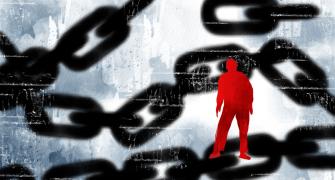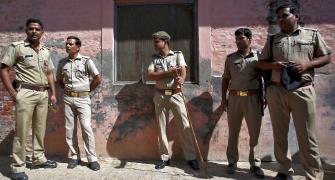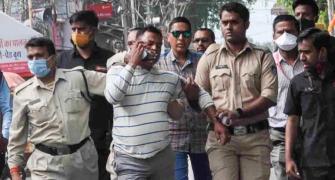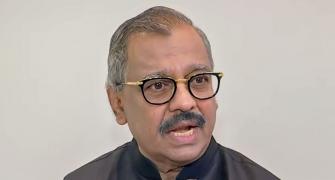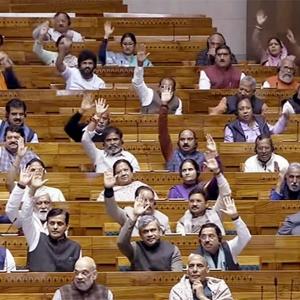'...by directing these draconian provisions against political and ideological opponents of the ruling group, minorities, and those who dare to dissent through and selective prosecution and prolonged incarceration as undertrials.'
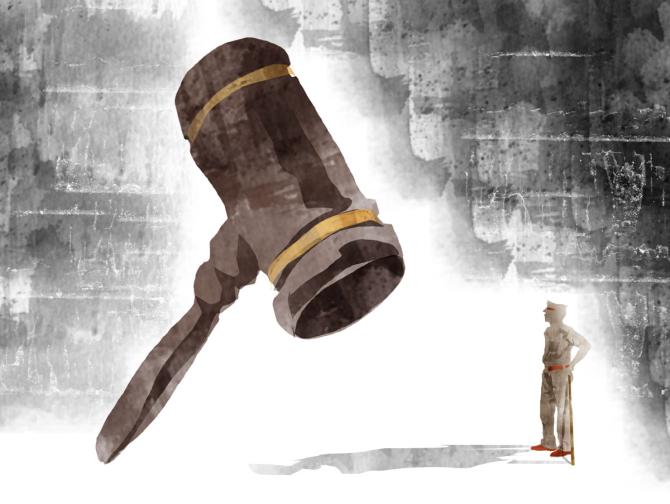
Ever since the Narendra Damodardas Modi government passed the three new laws -- the Bharatiya Nyaya (Second) Sanchita, Bharatiya Nagarik Suraksha (Second) Sanhita, and Bharatiya Sakshya (Second) Sanhita -- in Parliament last week, there have been concerns about its impact on the Indian people.
Rediff.com's Syed Firdaus Ashraf asked Dr G Mohan Gopal for his impressions of the new laws.
Dr Gopal was the director of the National Judicial Academy of the Supreme Court of India from 2006 to 2011. From 2012-2019 he was the founder chair of the National Court Management Systems Committee of the Supreme Court of India. He was also former director (vice-chancellor) of the National Law School of India, Bengaluru.
What is your opinion about the three new laws?
The three new criminal laws equip the State to scale up repression and suppress democracy.
The government says it is more Indian in nature and give up the colonial hangover of British laws.
I am not persuaded by the government's rhetoric.
Can you elaborate on your viewpoint?
The laws scale up repression by enhancing arbitrary police power.
The laws create a new offence of terrorism in addition to the existing offence of terrorism under the 1967 Congress-enacted draconian Unlawful Activities Prevention Act (UAPA).
They introduce new draconian laws against unorganised crime in addition to existing laws.
The State will have the option to charge people under either or both of these sets of laws.
While claiming that sedition has been abolished, the new laws introduce a new crime 'Acts endangering sovereignty unity and integrity of India', which is in effect 'sedition plus'.
It criminalises 'exciting' people, 'creation of excitement amongst people'; and 'encouragement of feelings amongst people', in support of undefined 'subversive activities'; 'secession'; 'separatist activities'; 'endangering sovereignty, unity and integrity of India'; and 'armed rebellion'.
The laws criminalise disobedience or disregard of the orders of the police and empower the police to detain people for 24 hours if they disobey.
Under the Indian Penal Code, any detention order was given after the police complaint to an executive magistrate that you as an individual were disobeying, and you had the right to be heard before detention. And the provision was mainly focused on removing public nuisance.
The laws increase the scope of dreaded police custody (where torture is notorious) some six-fold from a maximum of 15 days to up to 90 days.
Violating long standing judicial standards, the laws dilute the legal obligation of the police to file FIRs and register cases.
Again contrary to standards laid down by the Supreme Court, the laws escalate handcuffing, not only during arrest but also during production in court (granting an exemption to economic offenders).
To expand the surveillance State the laws mandate the provision of biometrics by those who are not accused but are arrested in a case (enhancing the incentive for arresting a person who is sought to be surveilled).
Incarceration is increased across the board. They have increased the number of capital offences.
These laws are equipped to suppress democracy by directing these draconian provisions against political and ideological opponents of the ruling group, minorities, and those who dare to dissent through and selective prosecution and prolonged incarceration as undertrials.
On the other hand, there is no real effort to enhance police accountability to the people.
The IPC (Indian Penal Code) was relatively more carefully structured and had safeguards.
The provisions in the new laws are not restrained by safeguards for the common person.
These laws are a recipe for suppressing liberty and democracy in our country.
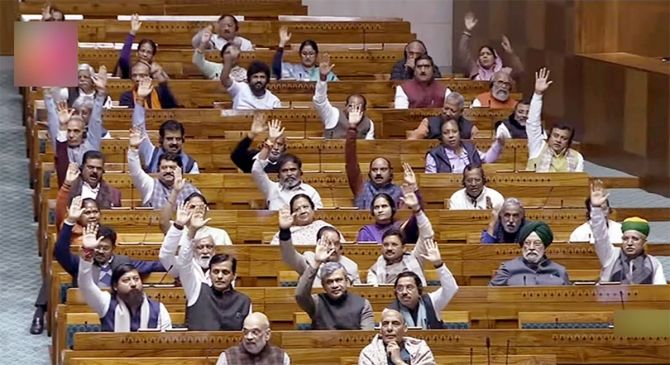
Is it not good that sedition has been abolished?
They have abolished sedition only to introduce what we need to understand as 'sedition plus', which I have already described.
This 'sedition plus' will hang over all of us like Damocles' sword.
It can be deployed in a targeted and selective manner at the whim of the political bosses who control the power of the Union.
Under the colonial IPC, sedition involved disaffection towards the government established by law.
The government itself says that the colonial 'raj droh' offence has been changed to 'Desh Droh'.
When they say 'Desh Droh' are they referring to the Constitutional Republic? I quoted Justice Aharon Barak (the former chief justice of Israel) in one of my lectures, 'The core of democracy is to protect human rights of individuals and minorities'.
Our Constitutional Republic of India is a nation that protects the human rights of individuals and minorities.
Or are they going to apply the majoritarian concept of nation which is the Hindutva Sangh Parivar concept of 'Hindu Rashtra'? The latter is more likely to be the interpretation of 'Desh Droh' of a Hindutva government.
What about the challenges of teaching these new laws in law colleges?
The change of names and changed numbering are transitional issues, not substantive ones. They are not critical issues.
All three laws have the name 'Bharatiya'. Two of the laws are named Sanhitas.
While the word Sanhita literally means a collection, it is also a name of a section of each Veda.
This is the first time we are forcing people to use religious Vedic words in the names of laws of the land.
It is what is done in theocratic States. But it is a double edge sword.
Given that the laws will be applied in a repressive and draconian way, the masses will associate 'Bharatiya' laws and 'Sanhitas' with repression and injustice.
Theocratic countries know the risks to religions when religion is brought into governance.
Governance always involves, at the human implementation level, corruption, cruelty and brutality. And when you start to associate governance with religion, people will associate brutality and corruption and injustice with the religion.
In the long term this could help us build greater mass support for secularism and separation of Church and State.
Does it mean secular law will be dead in India?
There is no support for secularism from the government.
They are now starting to look at Constitutional issues with a theocratic, religious, colour.
They are giving increasing legal legitimacy to religious belief as a source of law.
They are blurring the distinction between Constitutional values and religion through judicial interpretation.
Hindu Rashtra could come through theocratic judgments that will interpret the Constitution as a Hindu document and the Republic as a Hindu Rashtra, rather than through a new Constitution or extensive amendments to the current Constitution.
Does this mean that secular law is dead in India? No, even if the Government repels it, secularism and secular law will always remain a potent force in a very diverse country like India.

Has this shift started lately or did this start much earlier?
This shift started longtime ago, even when the Congress was in power.
Whereas the Constitutional text had a strict separation of Church and State (the Hindi version says, 'Panth Nirapeksh'), from the outset the Congress brought in the extra constitutional concept of 'Sarva Dharma Samabhava' and mixed religion into politics.
This was Gandhiji's theocratic understanding of India, which was multi theocratic, rather than secular.
Is Sarva Dharma Samabhava not another phrase for Indian secularism?
The Congress interpreted secularism so as to allow all religions to have some place in governance, not just one.
They derided the strict separation of religion and State as in France (laicite).
The judiciary also by and large accepted the idea that Indian secularism was Sarva Dharma Samabhava and not laicite.
A member of the Constituent Assembly, who had a Hindutva perspective, disagreed with this approach.
He indicated he was prepared to live with a strict separation of Church and State, but would not agree with Hinduism having to compete on an equal basis with minority religions.
He said, either you make Hindu religion the State religion or exclude all religions.
The assertion of the superiority of the religion of the so-called majority, and the exclusion of the religion of the minorities was a natural next step to the Congress policy of mixing religion and governance.
So what do we call ourselves now Dharm Nirpeksh or Pant Nirpeksh? Where are we headed in the future?
We are a Pant Nirpeksh and not a Dharm Nirpeksh country.
Dharma is an imprecise concept as indeed is the idea of 'religion'.
Now from 'Sarva Dharma Samabhava' we are heading to a 'Hindu Dharma Bhava'.
The RSS and Hindu Mahasabha have been saying openly, for the last 100 years, that India is a Hindu Rashtra.
There was no hidden agenda from their side. It is just that we (secularists) were not taking them seriously.
For them, it is just a question of formally recognising it. We are heading towards this formalisation of the Hindu Rashtra.
If that happens, India will no longer be a democracy. Without a liberal democracy, the chances that a monophonic Hindutva autocracy can hold our vast and diverse country together by force for long are slim.
Feature Presentation: Rajesh Alva/Rediff.com

